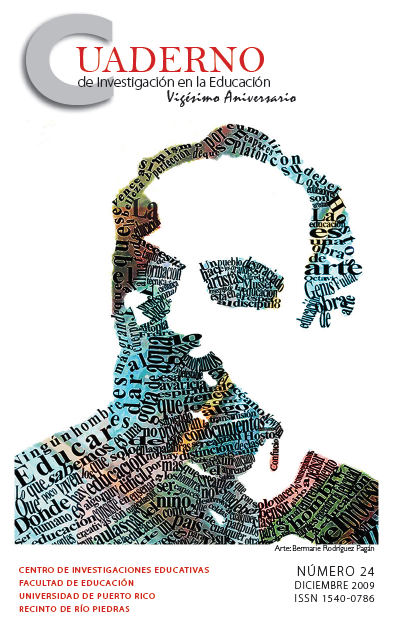Abstract
Given the challenges that come with the advent of the knowledge era (competitiveness of the processes of globalization and regional integration) and the need for a "comprehensive model of knowledge and skills" that can guide the academic and the world of work for student life in higher education institutions, drew up a typology of trends in transformation of these institutions on the stage of transition to the knowledge era, which affects the functions of creation, transformation, research, dissemination, training and service to the society. To meet the challenges they bring such trends in academic and campus life, was also built, as a purpose, a typology of knowledge and skills as a platform, a reference and starting point for designing education and training to the extent that higher education institutions, businesses, educational institutions and professions should be taken into account for the articulation of their learning strategies, student life (graduate profile) and training, to guide and manage the requirements of competitiveness, the world of work and living of the citizenry. In addition, to meet the challenges of the new context, lines of action are recommended routes and strategies as institutions transition into the era of knowledge and its contribution in building autonomous, democratic and sustainable knowledge societies.
How to cite:
Aponte Hernández, E. (2009). Formación académica y vida universitaria: Tendencias y retos de la era del conocimiento para construir sociedades del conocimiento. Cuaderno de Investigación en la Educación, 24, 19-46. Retrieved from https://revistas.upr.edu/index.php/educacion/article/view/13547
References
Aponte, E. (2008). Accesibilidad, inclusión y equidad en la educación superior en América Latina y el Caribe: tendencias y retos. Documento presentado en el XXIX Pleno Nacional de Bienestar Universitario, Asociación Colombiana de Universidades, Cali, Colombia: ASCUN.
Aponte, E. (2004a). Conocimiento y competencias del trabajo en la economía del conocimiento y la sociedad del aprendizaje: retos para las empresas, la educación superior y la integración de Norteamérica. AMPEI, 8.
Aponte, E. (2004b). Nuevo contexto y escenario de transformación y reformas de las universidades en Norteamérica y la periferia. Fascículos de Educación Superior, 2.
Aponte, E. (2004c). Hacia la universidad de autogestión del conocimiento. Cuaderno de Investigación en la Educación, 18.
Aponte, E. (1998). Growth, diversification and differentiation: A typology of transformation trends in higher education. Paris: UNESCO.
Aristóteles. (A.C.). Retórica. 77,136 3b.31
Benedito Ferrer, V. & Ferreras, V. (1999). La formación universitaria a debate. Barcelona: Universidad de Barcelona Editores.
Unión Europea. (1999). Tratado de Boloña. Italia: Acuerdo de Boloña.
Castro, E. (2004). El currículo basado en competencias: factor en el mejoramiento de la calidad de la educación superior y criterio para la acreditación nacional e internacional. Santiago, Chile: Documento de Trabajo.
Delors, J. et al. (1996). La educación encierra un tesoro. Paris: UNESCO.
DeSeCo/OECD. (1997; 2003). Las competencias claves para el bienestar personal, económico y social. Málaga: Ediciones Aljibe.
Escudero, J. M. (2005). Las competencias profesionales y la formación universitaria: posibilidades y riesgos. Revista de Docencia Universitaria, 2.
Freire, P. (1997). A la sombra de este árbol. Barcelona: Editores El Roure.
Gómez, V. & Tenti, E. (1989). Universidad y profesiones: crisis y alternativas. Buenos Aires: Nino y Dávila Editores.
Jarvis, P. (2001). The Age of Learning: Education and the knowledge society. London: Kogan Page Publishers.
Hargreaves, A. (2003). Enseñar en la sociedad del conocimiento. Barcelona: Octaedro.
Larraín, A. M. & González, L. E. (2006). Formación universitaria por competencias. Chile: CINDA.
OECD. (1996; 2004). Measuring what people know: Human capital, accounting for the knowledge economy. Paris: Organization for Economic and Cultural Development.
San Martín, V. (2002). La conceptualización corriente de calificación y competencias. Revista Iberoamericana de Educación, 3.
SCANS. (1990). Secretary‘s Commission for Achieving Necessary Skills Report. Washington, D.C.: Department of Labor.
Tedesco, J. C. (2000). Educar en la sociedad del conocimiento. Buenos Aires: Fondo de Cultura Económica.
Tinto, V. (1992). El abandono de los estudios superiores. México: ANUIES.
Tuning Report-TUESE. (1997-2003). Tuning Educational Structures in Europe, Final Report (Spanish). Bilbao: Universidad del DEUSTO.
UNESCO. (2005a). The quality imperative in education. Paris: UNESCO.
UNESCO. (2005b). Hacia sociedades del conocimiento. Paris: UNESCO.
UNESCO. (2006). Understanding knowledge societies. Paris: UNESCO.
Villarini, A. (2006). La conciencia moral y ética como competencia humana general. San Juan: Universidad de Puerto Rico: Fundación para el Desarrollo del Pensamiento y Desarrollo Humano. http://www.uni.pddpupr.org
Zabalza, M. A. (2006). Competencias docentes del profesorado universitario: calidad y desarrollo profesional. Madrid: Narcea Editores.
Zabalza, M. A. (2004). La enseñanza universitaria: el escenario y sus protagonistas. Madrid: Narcea Editores.
Zamora-Tovar. (2002). Formación universitaria en la era de la información. Universidad Autónoma de Guadalajara. Academia, 2.
The contents published in the Puerto Rico Journal of Education is freely distributed under open access practices, in accordance with the Creative Commons license, Attribution-NonCommercial 4.0 International (CC BY-NC 4.0). Through these principles, the journal and its authors allow readers to access, reproduce and share articles in full text. Users should give credit to authors in a reasonable way without suggesting they have their support. Under no circumstances, readers may make use of the contents for commercial purposes. The authors retain copyright on their works.

